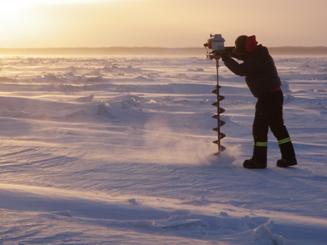Report to Parliament 2015 to 2016: Canada Water Act: chapter 1
Executive summary
The Canada Water Act provides an enabling framework for collaboration among the federal and provincial/territorial governments in matters relating to water resources. This annual report highlights Environment and Climate Change Canada’s (ECCC) operations under the Act from April 1, 2015, to March 31, 2016.

ECCC hydrometric technologist drills on the frozen McKenzie River to measure water flow under ice.
Photo: Brian Yurris © Environment and Climate Change Canada
During 2015-2016, the National Hydrometric Program (NHP) continued to provide water level and flow information to Canadians through a federal, provincial and territorial cost-shared network of approximately 2788 hydrometric stations. ECCC’s Water Survey of Canada (WSC) program, the federal partner in the NHP, continued to operate approximately 2140 stations, about 1100 of which are fully or partially federally funded. Work also continued on outreach, technology development and maintaining the program’s International Organization for Standardization certification.
Regarding the Joint Canada-Alberta Implementation Plan for Oil Sands Monitoring (JOSM), an external expert scientific review stated in their report that: “JOSM has made significant advances over the monitoring in place prior to 2012 by establishing more robust and comprehensive monitoring and improving the rigour, transparency and adherence to internationally recognized standards and protocols of the monitoring”. The Review Panel Chair gave the monitoring a “solid B grade”.
ECCC continued to lead and coordinate implementation of the 2014 Canada-Ontario Agreement on Great Lakes Quality and Ecosystem Health (COA). A joint federal-provincial assessment of progress against the 233 commitments identified in the Agreement completed in 2016, found that all COA commitments are on track to be completed by 2019. The COA Executive Committee, established to oversee the Agreement, concluded that one commitment (to develop a framework for monitoring natural recovery in Canadian Great Lakes Areas of Concern) is no longer needed as there is sufficient guidance available from the field of contaminated site management to monitor natural recovery in Areas of Concern.
Implementation of the Canada-Quebec Agreement on the St. Lawrence (2011-2026) continued, delivering 43 projects from its joint action program, along with activities under the Monitoring the State of the St. Lawrence River Program and the Numerical Environmental Prediction Program for the St. Lawrence.
In 2015-2016 the Atlantic Ecosystem Initiatives Funding Program included 14 projects relating to water quality, biodiversity and climate change. These included the enhancement and improvement of water quality and watersheds through activities such as identification and assessment of threats to water resources, water quality monitoring and research, and development of ecosystem management tools and management plans.
ECCC, through the Lake Winnipeg Basin Initiative (LWBI), continued to deliver on its mandate to reduce nutrient pollution in Lake Winnipeg and its basin through 13 scientific research projects, financial support for 31 stewardship projects and transboundary nutrient reduction activities.